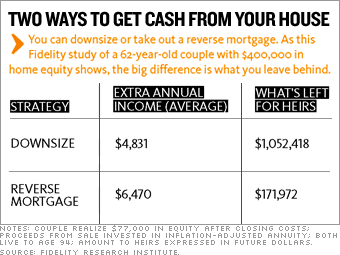Treating your house as the ultimate retirement insurance is an easy trap to fall into. Even with the housing market in the doldrums, the five-year real estate bull market has likely left you feeling house-rich. According to a 2004 study by the National Economic Bureau, upper-income boomers ages 51 to 56 have a third of their net worth invested in their principal residence.
As recently as May, a survey of affluent boomers by financial adviser Bell Investments Advisors found that nearly 70% were relying on their homes as a retirement asset. Question is, will the strategy work? The answer is, not that well.
Why? Because it's hard to eat out on your home equity. You have to live somewhere. To turn your equity into cash, you can sell and then rent, move to a cheaper area or downsize. Most retirees prefer to stay put. Yes, you can do what a small but growing number of retirees are doing: Get a reverse mortgage, which is a loan against the value of your house that you don't have to pay back. (When you die or move out, the loan is paid off by the sale of the house, which means you may not be able to pass the home on to your children.)
But these loans give you much less than the value of your house. For homeowners ages 62 to 69, lenders will typically let you borrow just 49% of your home equity, says Wharton finance professor Nicholas Souleles.
The best way to look at your house is as a place to live, not a retirement account. So in the years leading up to retirement, don't overinvest in it with the idea that you can get that money out later. Keep your mortgage and other housing expenses to no more than 28% of your income, and don't prepay your mortgage instead of saving for retirement.

